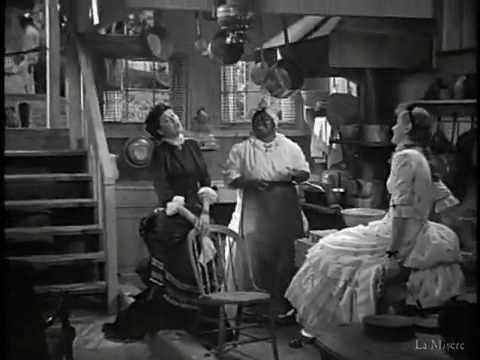For the final Song of the Day of my week here at NYFOS, let me introduce you to the reason I became a singer: Paul Robeson. If ever there was an human embodiment of the traits I most value in an artist and human – communication, fearlessness, skill, an open heart, a brilliant mind, hard work, and a deep sense of service – it was Robeson.
This song, “Old Man River,” is taken from the musical Show Boat, by Hammerstein and Kern. Though the role, Joe, was written with Robeson in mind, he was not available for the original Broadway production. When he did take it up, though, in London in 1928, in the 1932 Broadway revival, and, most notably, in the 1936 film, it made him a star. International concert tours, theater productions, and Hollywood films followed. By rights, modern Americans would remember him as one of our truly great artists, along with actors like Gary Cooper, Humphrey Bogart, Clark Gable, James Dean, and singers like Bing Crosby, Ella Fitzgerald, and Johnny Mercer. But it was not to be.
Fiercely political, Robeson viewed his work as inseparable from its political context, and advocated for pro-labor, anti-fascist, anti-racist, anti-colonialist policies and organizations. In 1937, Robeson went abroad during the Spanish Civil War to meet and sing for Republican troops, which made him a hero to those who opposed fascism. His association with left-wing politics throughout the 1930s and 40s, visits to the U.S.S.R., and outspoken critiques of American racism led to his fall from grace in the mainstream American consciousness. During the McCarthy era, he was blacklisted, his passport was revoked, and his previously meteoric career was cut short. When the House Un-American Activities Committee asked why he didn’t stay in the U.S.S.R., given his political affiliations, he gave a tremendously patriotic response: “Because my father was a slave and my people died to build the United States, I am going to stay here, and have a part of it just like you, and no fascist-minded people will drive me from it!”
For an example of the way his politics informed his work, look no further than the song that made him famous, “Old Man River.” In Show Boat, the character of Joe has been described as a one-man Greek chorus, framing the human drama of the musical’s plot with a re-occurring musical gesture invoking the ever-flowing Mississippi River, and subtly comparing the unchanging river with the perpetual hardship of the African-American working on her shores. In the original lyrics by Oscar Hammerstein II, Joe comes across as impassive and resigned, with perhaps the subtlest touch of political discontent with his lot and that of his people. Beginning in 1938, whenever Robeson performed this song in concert, he changed the words, giving the song a very different feel:
•Instead of “Dere’s an ol’ man called de Mississippi, / Dat’s de ol’ man that I’d like to be,” Robeson sang “There’s an ol’ man called the Mississippi, / That’s the ol’ man I don’t like to be.”
•Instead of “Tote that barge! / Lift that bale! / Git a little drunk, / An’ you land in jail,” Robeson sang “Tote that barge and lift dat bale!/ You show a little grit / And you lands in jail.”
•Most strikingly, instead of “Ah gits weary / An’ sick of tryin’; / Ah’m tired of livin’ / An skeered of dyin’, / But Ol’ Man River, / He jes’ keeps rolling along!”, Robeson sang “But I keeps laughin’/ Instead of cryin’ / I must keep fightin’; / Until I’m dyin’, / And Ol’ Man River, / He’ll just keep rollin’ along!”
Gone is any sense of impassivity or complacency. Instead of drinking, it’s standing up for yourself, speaking your mind, and organizing for rights that provokes the response of the law. Resignation is replaced by an unquenchable spirit. Instead of feeling sympathy for Joe, the audience is moved by his resilience in the face of oppression, perhaps even moved to action.
I could write about this man for days on end. The son of an escaped slave, he attended Rutgers University on a football scholarship (the third Black student in their history), winning academic, oratorical, and athletic awards, including two first-team All American selections, and graduated valedictorian. He attended Columbia Law School, supporting his studies with off-Broadway performance and a side job playing the End and Tackle positions at an upstart organization called the National Football League. He starred in Emperor Jones, the first Hollywood film with a leading Black actor. He was the first Black actor to play the title role of Othello on Broadway with a white supporting cast, and the first to do so in London since the great Ira Aldridge. Though he isn’t remembered as he might have been, he has been cited as an influence in the work of artists James Baldwin, Sidney Poitier, and James Earl Jones (who performed an acclaimed one man show based on Robeson), and was a model for the artist-as-activist model that became so important to the Civil Rights Movement.
Robeson was a great artist by any measure, but that wasn’t the end of his story– it was the beginning. The troubles he went through, and the corresponding collapse of his legacy in America, say much more about us as a nation than they say about him as an artist.
While I always loved music, it wasn’t until I discovered Robeson in my teens that music began to seem a possible avenue for my life’s work. That an artistic life could be so fully realized, and at the same time so interwoven and relevant to public life (for nothing could speak more clearly as to what a society fears than repression of its outspoken public figures) was, and is, a revelation.I leave you with his epitaph, recorded in a message commemorating fallen Welsh fighters on the anti-fascist side of the Spanish Civil War: “The artist must take sides. He must elect to fight for freedom or slavery. I have made my choice. I had no alternative.”



Fascinating account of a fascinating and sadly un-celebrated man – thank you